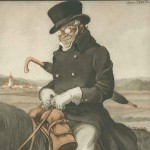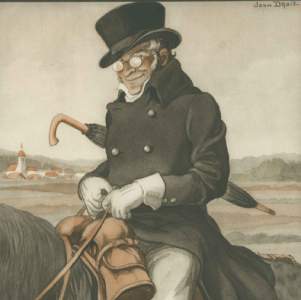
 Un médecin de campagne sous la Restauration, BIUMShould the new career of assistant medical be understood as a return to the Officiers de Santé status?
Un médecin de campagne sous la Restauration, BIUMShould the new career of assistant medical be understood as a return to the Officiers de Santé status?
The brand-new creation of the new, as yet rather vague, profession of assistant.e médical.e, calls for a return on those who were, in some respects, their forerunners: the post-Revolution officiers de santé (health officers) recruited between 1803 and 1892. As of today, the object was to address the very imbalanced geographic distribution of Doctors of Medicine (MD) who favoured cities and towns. It was then decided to set up an autonomous body, a second order of physicians, the Officiers de Santé, whose practice was almost as independent and broad as that of the First Order MDs. The success of the programme notwithstanding, the profession made the object of bills intended to remove it. Targeted though it was by politicians, the profession was defended by the populations, local representatives and the full range of administrative tiers right up to the ministry, thanks to which the profession earned a reprieve.
Like all the Consulat’s major laws, the 19 ventôse an XI (11 mars 1803) Law, addressing the practice of medicine, was a compromise between the Ancien Régime and the Revolution. It upheld the former’s close-knit medical elite, whose doctorate required four years’ expensive studying in one of just three universities awarding it. The thinking was that their superior training would enable them to attend – at a premium – to wealthy town patients with complex conditions. The Revolutionary draft bills provided for covering evenly the whole territory with trained doctors. This requirement was met by recruiting health officers endorsed, after short studies or on evidence-based practical experience, by a board in each département. In order to avoid their swamping the towns, the law restricted their practice to the département that add admitted them. Every move would require a fresh test and the payment of related levies. The calculation was that their modest, rural extraction would keep them in the service of countryfolks, at minor costs – as was indeed the case for the vast majority.
All the same, those health officers were very soon under attack from the medical doctors, who had sympathetic mouthpieces in both Chambers and in the government. The official objection was the poor training and incompetence that made them dangerous. The private one was the modest fees, the competitivity of which prevented MDs from setting up in the countryside. Under the July Monarchy, the Academy of Medicine and numerous medical journals turned up the pressure on the government. All the ministers for Public Education, under whose authority health officers were placed, Guizot, Villemain, Cousin, Salvandy, maintained their forerunners’ position but, evoked with increasing frequency, the suppression of the health officer rank was peremptorily voted by the Upper Chamber in 1892. It took the February Revolution to stop its adoption. Even though the law suppressing the rank of health officer was only passed in 1892, the 1854 decree which toughened the financial and intellectual criteria to qualify as a health officer brought about a massive drop in manpower, which went from 8000 in 1843 to 2000 in 1892 to 200 in the 1920s.
And yet while health officers were ever the butt of the higher national political instances, they were cossetted by local authorities whose favour was deployed when an officer sought a test exemption in order to practice in a département other than the one in which they had been admitted. Mayors, councillors, MPs stepped in to support the applicant. Sometimes the local populace backed them up with group letters. Faced with such pressure, sous-préfets and préfets would in most cases give their approval which the ministry of Public education sanctioned piecemeal, citing doctor shortages in most cases. In this framework Martignac launched in 1828 the first national inquiry into medical geography. Conceived of as early as 1828, the creation of publicly funded district doctors, formed part of the bill Salvandy (1847) drafted before it was locally authorised (1854) in the framework of the law on free medical assistance. Thus, the short-lived position of Officier de Santé was an essential stage in the march towards universal access to health care.
Read the paper in franch version
Follow the reading on the dictionnary : Emergency medicine
Références :
Olivier Faure, Contre les déserts médicaux, les officiers de santé en France (1ere moitié XIXe siècle), Tours, PUFR, 2020, 282 p.
Olivier Faure, Les Français et leur médecine au XIXe siècle, Belin, 1993.
To quote this paper : Olivier Faure "Officiers de santé" in Hervé Guillemain (ed.), DicoPolHiS, Le Mans Université, 2021.